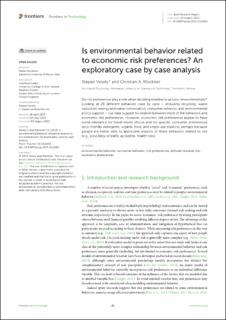| dc.contributor.author | Vesely, Stepan | |
| dc.contributor.author | Klöckner, Christian Andreas Nikolaus | |
| dc.date.accessioned | 2023-11-21T09:36:13Z | |
| dc.date.available | 2023-11-21T09:36:13Z | |
| dc.date.created | 2023-09-01T15:05:44Z | |
| dc.date.issued | 2023 | |
| dc.identifier.issn | 1664-1078 | |
| dc.identifier.uri | https://hdl.handle.net/11250/3103782 | |
| dc.description.abstract | Do risk preferences play a role when deciding whether to act pro-environmentally? Looking at 28 different behaviors case by case – including recycling, waste reduction, energy and water conservation, consumer behavior, and environmental policy support – our data suggest no relation between most of the behaviors and economic risk preferences. However, economic risk preferences appear to have some relevance for travel mode choice and for specific consumer preferences (eco-friendly detergents, organic food, and single-use plastics), perhaps because people are better able to appreciate aspects of these behaviors related to risk (e.g., possibility of traffic accidents, health risks). | en_US |
| dc.language.iso | eng | en_US |
| dc.publisher | Frontiers Media S. A. | en_US |
| dc.rights | Navngivelse 4.0 Internasjonal | * |
| dc.rights.uri | http://creativecommons.org/licenses/by/4.0/deed.no | * |
| dc.title | Is environmental behavior related to economic risk preferences? An exploratory case by case analysis | en_US |
| dc.title.alternative | Is environmental behavior related to economic risk preferences? An exploratory case by case analysis | en_US |
| dc.type | Peer reviewed | en_US |
| dc.type | Journal article | en_US |
| dc.description.version | publishedVersion | en_US |
| dc.source.pagenumber | 4 | en_US |
| dc.source.volume | 14 | en_US |
| dc.source.journal | Frontiers in Psychology | en_US |
| dc.identifier.doi | 10.3389/fpsyg.2023.1212685 | |
| dc.identifier.cristin | 2171727 | |
| cristin.ispublished | true | |
| cristin.fulltext | original | |
| cristin.qualitycode | 1 | |

